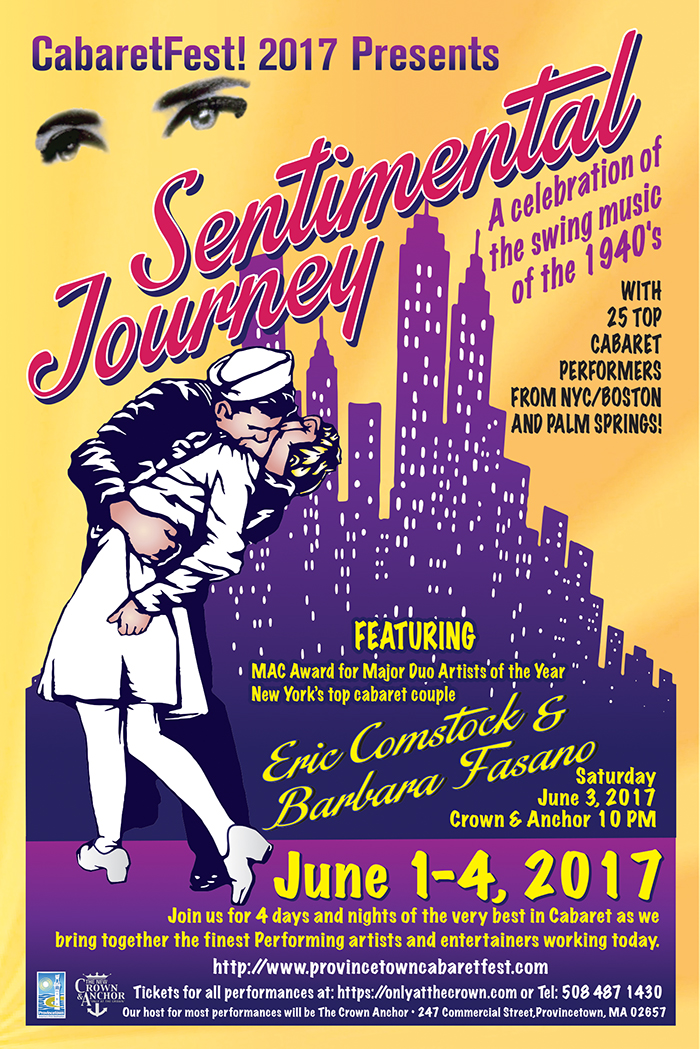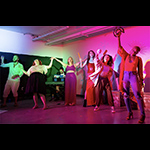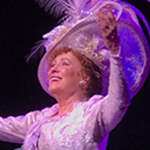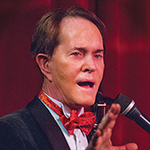A Conversation with Patricia Fitzpatrick
May 17, 2017
By John Amodeo for Cabaret Scenes
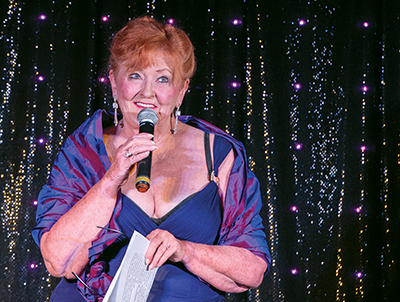
Photo: Bob Bond
Provincetown, that lovely little fishing village at the tip of Cape Cod, Massachusetts, has always been a haven for artists practicing all forms of art. Cabaret, among them, has flourished in Provincetown, particularly in the early 1980s when people like Carol O’Shaughnessy, Karen Mason, Sharon McNight, Jenifer Lewis, and numerous other cabaret divas would be able to work for entire summers in small rooms, like the comfy lobbies of The Pilgrim House, The Gifford House, and the Crown & Anchor. Picking up on that history, John O’Neil founded CabaretFest! Provincetown back in 1999, packing back-to-back shows, workshops, master classes, and panel discussions into a long weekend of heady entertainment, education, camaraderie, and flat-out fun. The Provincetown Business Guild (PBD) partnered with drummer Bart Weismann to continue the tradition after O’Neil moved on to other projects, but didn’t get past three seasons. There was a short gap of several years, where many thought CabaretFest! Had seen its last day in Provincetown.
https://theoryofknowledge.net/wp-content/languages/new/resume-preparation-service.html
Step in Patricia Fitzpatrick, a no-nonsense Provincetown mover and shaker, to pick up where the PBD had left off. Now in her third year, she has built CabaretFest! Provincetown back into a going concern that may even have enough legs to travel to other parts of the country. Fitzpatrick’s own singing career was transformed by taking a CabaretFest! Provincetown Master Class back in 1999. Prior to that, she had a very different approach to the music. “When I was 20, I was a girl singer with a big band at the La Playboy Club in Detroit,” she recalls. “It wasn’t about audiences getting to know me. I just wanted to sing the song. But in cabaret, it’s more intimate, more vulnerable. My own daughter told me after a show that she cried, saying, ‘Mom, I didn’t know you could do that to me.’ Now I feel if I didn’t touch you, if I didn’t reach something deep down inside of you, then I’ve failed.” Fitzpatrick brings that same conviction to her third season producing CabaretFest! Provincetown, which runs from Thursday, June 1, through Sunday, June 4, primarily at The Crown & Anchor. Cabaret Scenes sat down with Fitzpatrick recently to talk about cabaret, CabaretFest!, some ghosts of the past, and to share a lot of laughs.
John Amodeo: Patricia, you were Provincetown’s Director of Tourism when John O’Neil approached you for a grant to help him produce the first CabaretFest! Provincetown in 1999. What did you think of the idea then, and why did you continue to support it in the years that followed?
Patricia Fitzpatrick: When John came to me, I asked him “What is cabaret?” I had no idea, and he had to explain it to me. But, when I went, I thought this was a perfect entertainment form for people like me, because it was about telling a story with a lyric, instead of having an American Idol-type of voice. I participated in a Carol O’Shaughnessy workshop and learned the art of cabaret. I found it far more intimate and rewarding, and that’s why I stayed involved. When the PBG said they wouldn’t fund it anymore, I wanted to keep it going. Not only as a place to perform, but also as a place to teach, because it was that master class that made the difference to me.
JA: What is it about cabaret that distinguishes itself from other forms of live musical entertainment?
PF: The word I used before was intimate. That’s the word that comes back to me again and again. It’s an intimate performance with the lights lower. The audience should know the performer better at the end of a show than when they walked in. Not the history of Peggy Lee or Frank Sinatra. The patter is what helps the performers really connect with their audience. Barry Levitt, John O’Neil, and Eric [Comstock] and Barbara [Fasano] are all giving workshops and talking about how important the lyric is to telling the story. As a side note, what James [Locke, CabaretFest! co-producer] and I try to do is watch the workshops and see who gets it, and on the Sunday breakfast, we select them to sing to show what they learned.
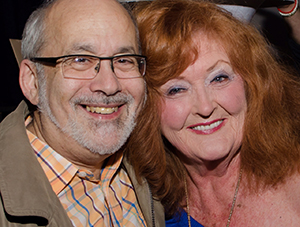
Photo: Bob Bond
JA: In many forms of entertainment, aging can be a liability, but not so in cabaret. Why is that?
PF: The older you are, the more you have to share. The older I get, the easier it is to introduce myself to perfect strangers because I’m not attached to their response. Younger people who come into cabaret often don’t fit, because they want to show off their voices. But that gets boring after 10 or 15 minutes if they are not talking to you.
https://theoryofknowledge.net/wp-content/languages/new/how-to-solve-math-word-problems.html
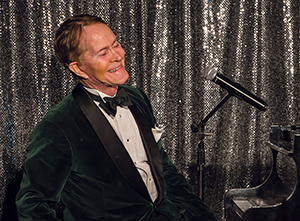
Photo: Bob Bond
JA: Why mix workshops and master classes in with entertainment in the program for CabaretFest?
PF: Since the experts are already coming to perform, they often volunteer and ask if we would like them to do a master class and, of course, we say yes, they can. It’s what grows the industry. It’s not going to keep growing if we don’t train the next generation. Last year, Steve Ross was so laid back as a teacher, like warm milk. When he performs, it’s like honey. You get to see how he uses what he teaches.
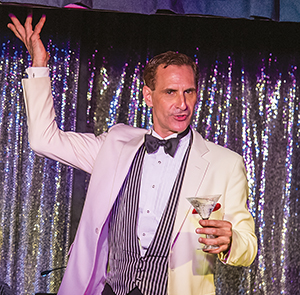
Photo: Bob Bond
During CabaretFest! Two years ago, I sat in on a master class of Mark Nadler’s and a performer broke into tears during a song.
https://theteacherpreneur.com/wp-content/languages/new/essay-writer-service.html
And, when she sang it in an event later, it was magic, because she learned from Mark how to make people feel.
Talent-hunting is another thing that comes to mind. Take Rod Ferguson, for example, an emerging performer whom I only met once in a master class. I’m giving him a show slot this year because I want to see what he does moving a show into a live audience.
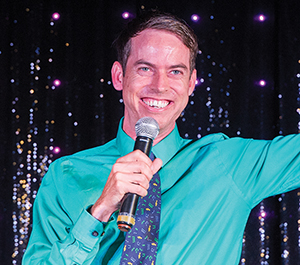
Photo: Bob Bond
JA: You are also a cabaret performer yourself. How does the experience of producing cabaret differ from performing it?
PF: When I am a performer, I am in the people-pleasing business and I pitch myself to a club. That’s the part of being a cabaret performer I don’t like. When I started putting the Festival together, people came to pitch to me. It was eye-opening to see how people, whether from the top tier or just starting out, pitch to me. Some come across desperate, while others come across very demanding, when I don’t even know who they are. Then there are the pros, who know what’s involved, who want to help, who network, who show up at other people’s performances and cheer them on, and participate in a panel. Those people who support the art form, wearing the Festival badge as they walk around town, posting the event on their Facebook pages, those people are angels. They make it gratifying for a producer. It’s not as much about ticket sales. That first year, I lost a tremendous amount of money, so much, I thought I wouldn’t do it again. The second year, we knew more about what we were doing, and we maybe made about $600. Some people golf. I do this. It’s a passion; it keeps me involved. This year, I think we are ahead of the game. It has momentum now. People call and ask how they can help. It’s starting to take on a life of its own.
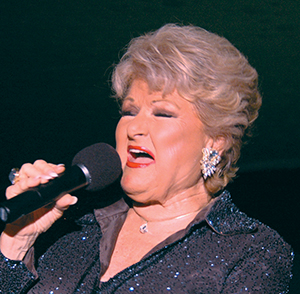
JA: This year, you are offering a Lifetime Achievement Award to MAC Award-winning legend Marilyn Maye at a special event on Saturday night. This is a second time for you offering this award. What triggered this addition to the program? [For an interview with Marilyn, please visit http://wp.me/p5cyEU-4J3]
PF: When Bobby Wetherbee was offered the award last year in advance, he said to me, “Honey, I’ve be doing this for 60 years, and nobody cares.” But on the evening, when he walked out on stage into a SRO room of applauding people, he had tears in his eyes.
I did a show in New York on my 75th birthday and Marilyn Maye was at the club, having been invited by [club manager] Sidney Myer, and we developed a rapport. She’s savvy and sophisticated, and knows what’s what. She could charm a snake out of a tree. I began watching her on YouTube, and she blew me away. So I wrote to her, and she is very excited about it, even though she has 45 Lifetime Achievement Awards. She said each one is like the first, and she loves PTown, so it’s a double whammy.
JA: You are also bringing cabaret power couple Eric Comstock and Barbara Fasano to CabaretFest! as your Saturday night headliners. How did you decide on them?

PF: I went to an event that Mark Nadler did prior to hiring him, kind of scoping him out. In that audience were Eric and Barbara, and I got to talking to them, and I really liked their easiness. Then I had friends who’d seen them, who said they were so good. They had this show, Downton Abbey Road, which fit our 1940s WWII theme. [For an interview with Eric & Barbara, please visit http://wp.me/p5cyEU-4J3]
JA: In addition to these seasoned cabaret veterans, you are also featuring many local emerging cabaret performers. Why do you make that part of your program?
PF: If you don’t have apprenticeships, then cabaret won’t be cabaret anymore. I’ve seen opera singers in NYC do a cabaret show and I think, “Why are they doing this?” So I find people who can learn from the greats and carry the art form forward. I saw Mary Callanan (Bandstand) do one song in a Carol O’Shaughnessy master class [CabaretFest Provincetown 1999], and it was OK. Then she had Mary sing the same song uptempo, then lie on the floor and sing the same song, and each time it came out differently. Same lyric, same song, and it worked. She had another singer move into the crook of the piano, put her hands in her pockets, and told her not to move while she sang, and she sang it and I got shivers.
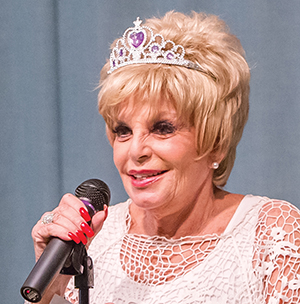
Photo: Bob Bond
JA: Last year, in fact just about a year ago, we lost cabaret legend Dana Lorge, a close friend of yours, and with whom you performed many times, both in New York, and at CabaretFest!Provincetown. What did her passing mean to the cabaret world, and to you personally?
PF: It was devastating. Two years ago at CabaretFest!—my first year producing, and I was performing as well—she was ordering me around, which goes with the territory. She called me up [perfectly impersonating Lorge’s raspy New York accent], “You’ve got to come pick me up.” I told her, “You’re a pain in the ass. You can walk. It’s only two blocks.” She said, “I’m all dressed up, I’m not going to walk.” I pulled up to pick her up, and she looked like a ghost. I didn’t know she was ill at the time, but she looked like a ghost. And because my son had cancer, I knew, and I asked her, “Are you in chemo?” And she said, “Yes.” A year later, Richard Skipper called me late one night to tell me she had passed, and it was like having a rock dropped on my head. When she performed, she was so generous to other performers, inviting kids to the Iguana. She’d smile and say to them, “Come show ’em what you’ve got.” She coached people to help them along. She didn’t have children. We were all her children. And she was like Mama Rose. She supported every entertainer. There wasn’t a time when she didn’t open up her big bag and reach into it and say, “I have a gift for you,” and she would present you with some big gaudy piece of jewelry that we all wore proudly, because it was from Dana. She was bossy, too. She was like a cabaret dominatrix. Like nuns I had in school. Tough love. But I learned from her. She was honest. Like when she did “Lies of Handsome Men,” which brought people to tears. When she sang that, she just tore me apart. We lost something when she died. We’re not going to get the Julie Wilsons and Dana Lorges back.
JA: Are you working on a show at the moment that you plan to perform in the near future?
PF: I’m trying to put a show together at the White Wind Inn, called The 1940s Radio Show. The show I did, 1941, just resonated with me, so I’m going to bring it back to NYC. I did it to celebrate my 75th year, because I didn’t think anyone else would [laughs]. It worked for me because it’s very nostalgic. It’s all the music from 1941, my birth year, and the show was about the music of that year and stories of my life—it was the year M&Ms came out. It’s easy to do, because I can take an audience through the chronology of my family. I did a lot of research on the year, and “Begin the Beguine” was a big hit. But thought I couldn’t do it because I don’t have the voice for it, or a big band. But Brian Patton, my musical director, got out his box of small instruments and passed it out to the audience, and it’s both corny and gets people crying, too. It’s not my voice that carries the song; it’s my presentation. I used to have a voice, but even though I only smoked less than a pack a day, it took its toll. But in cabaret, it’s not my voice, if I take 13 songs and weave them into an arc that tells a story, then I’m golden. I tell people I’m a performer.
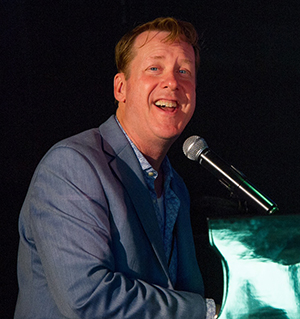
Photo: Bob Bond
JA: From your producer’s perspective, what is your favorite thing about CabaretFest!Provincetown?
PF: It’s watching the networking. It’s what gives us the most joy. We were driving home from the first cabaret festival, knowing that my son was lying in a hospital in critical condition, but still talking about how fabulous it was how all these people were meeting each other. Some of these people then went on to do shows in Boston and New York, and get connected. I’ve even got a call from people asking me if I would come and do CabaretFest! in Florida, only because they heard this from word of mouth. It’s possible. We know how to do this now. Watching like proud parents seeing these entertainers connect with each other. Emerging people mingling with the best in the business. What happens at CabaretFest! is that everyone mingles. That’s what makes us the happiest.
CabaretFest! Provincetown runs from June 1-4, at the Crown & Anchor, Provincetown,MA. For tickets, visit www.provincetowncabaretfest.com or www.onlyatthecrown.com
For the complete schedule, go to http://wp.me/p5cyEU-4IW
